Unit4知识清单
2024仁爱新教材Unit4 Fun in the Sun!知识清单(默写版)
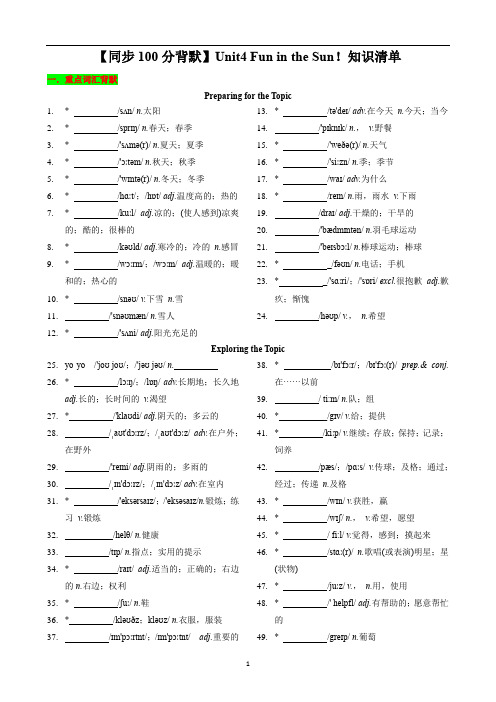
【同步100分背默】Unit4 Fun in the Sun!知识清单一.重点词汇背默Preparing for the Topic1.* /sʌn/ n.太阳2.* /sprɪŋ/ n.春天;春季3.* /'sʌmə(r)/ n.夏天;夏季4.* /'ɔːtəm/ n.秋天;秋季5.* /'wɪntə(r)/ n.冬天;冬季6.* /hɑːt/;/hɒt/ adj.温度高的;热的7.* /kuːl/ adj.凉的;(使人感到)凉爽的;酷的;很棒的8.* /kəʊld/ adj.寒冷的;冷的n.感冒9.* /wɔːrm/;/wɔːm/ adj.温暖的;暖和的;热心的10.* /snəʊ/ v.下雪n.雪11./'snəʊmæn/ n.雪人12.* /'sʌni/ adj.阳光充足的13.* /tə'deɪ/ adv.在今天n.今天;当今14./'pɪknɪk/ n.,v.野餐15.* /'weðə(r)/ n.天气16.* /'siːzn/ n.季;季节17.* /waɪ/ adv.为什么18.* /reɪn/ n.雨,雨水v.下雨19./draɪ/ adj.干燥的;干旱的20./'bædmɪntən/ n.羽毛球运动21./'beɪsbɔːl/ n.棒球运动;棒球22.* _/fəʊn/ n.电话;手机23.* _/'sɑːri/;/'sɒri/ excl.很抱歉adj.歉疚;惭愧24./həʊp/ v.,n.希望Exploring the Topic25.yo-yo /'joʊ joʊ/;/'jəʊ jəʊ/ n.26.* /lɔːŋ/;/lɒŋ/ adv.长期地;长久地adj.长的;长时间的v.渴望27.* /'klaʊdi/ adj.阴天的;多云的28./ˌaʊt'dɔːrz/;/ˌaʊt'dɔːz/ adv.在户外;在野外29./'reɪni/ adj.阴雨的;多雨的30./ˌɪn'dɔːrz/;/ˌɪn'dɔːz/ adv.在室内31.* /'eksərsaɪz/;/'eksəsaɪz/n.锻炼;练习v.锻炼32._/helθ/ n.健康33./tɪp/ n.指点;实用的提示34.* /raɪt/ adj.适当的;正确的;右边的n.右边;权利35.* /ʃuː/ n.鞋36.* /kləʊðz;kləʊz/ n.衣服,服装37./ɪm'pɔːrtnt/;/ɪm'pɔːtnt/ adj.重要的38.* /bɪ'fɔːr/;/bɪ'fɔː(r)/ prep.&conj.在······以前39./ ti:m/ n.队;组40.* _/gɪv/ v.给;提供41.* /kiːp/ v.继续;存放;保持;记录;饲养42./pæs/;/pɑːs/ v.传球;及格;通过;经过;传递n.及格43.* /wɪn/ v.获胜,赢44.* /wɪʃ/ n.,v.希望,愿望45.* / fi:l/ v.觉得,感到;摸起来46.* /stɑː(r)/ n.歌唱(或表演)明星;星(状物)47.* /juːz/ v.,n.用,使用48.* /' helpfl/ adj.有帮助的;愿意帮忙的49.* /greɪp/ n.葡萄50.* /fæst/;/fɑːst/ adv.快,迅速adj.快的,迅速的51./fiːd/ v.喂养,饲养52.* /bɜːrd/;/bɜːd/ n.鸟;禽53.* / red/ n.红色adj.红色的54.* /leɪk/ n.湖;湖泊Developing the Topic55.Tai Chi /ˌtaɪ tʃiː/ n.56.* / wen/ adv.,conj.什么时候;当……时57./'skiː/ v.滑雪(运动)58.* /'həʊmtaʊn/ n.家乡,故乡59.* /'trævl/ v.,n.旅行;游历60./'maʊntn/;/'maʊntən/ n.高山;山岳61.* /tɜːrn/;/tɜːn/ n.,v.转弯62.* /muːv/ v.移动;搬(家)Wrapping up the Topic63./'sɜːrveɪ/;/'sɜːveɪ/ n.,v.(做)民意调查64.* _/wiːk/ n.周,星期65.* /'aʊə(r)/ n.小时66./rɪzʌlt/ n.结果;后果;成绩67.* /kæp/ n.便帽,制服帽68.* / per/;/peə(r)/ n.一双;一对;俩69.* /ʃɔːrts/;/ʃɔːts/ n.短裤70.* /zuː/ n.动物园71./reɪs/ n.赛跑;速度;竞赛;竞争72.* / leg/ n.腿73.* /læst/;/lɑːst/ v.持续det.最后的;最近的adv.最终74.* /raɪt/ v.书写;写作;写信75.* /daʊn/ prep.向下;沿着adv.向下二.重点短语背默1.带某人去2.远足3.堆雪人4.去野餐5.在电话上6.穿,表演7.擅长8.为什么不9.叫某人做…10.整年11.对...有益12.热身13.太多14.踢足球15.下课后16.玩得高兴17.放弃18.继续做某事19.最后20.照像21.做运动22.遛狗23.喂鸟24.转弯25.从...学到了很多26.在家27.散步28.在不同的季节29.参加30.参与三.重点句子背默1.My parents usually .我的父母通常在周末带我们去徒步旅行。
Unit4Myhome(知识清单)人教PEP版英语四年级上册

Unit4My home知识点总结一、必会单词名词:bedroom卧室living room客厅study书房kitchen厨房bathroom浴室bed床phone table桌子sofa长沙发fridge冰箱二、必会句型1.Where’s Amy? 艾米在哪儿?——She is in the study.她在书房。
2.Where are the keys? 钥匙在哪儿?——They are in the door.它们在门里。
3.Is he in the living room?他在客厅吗?—Yes, he is .是的,他在/No, he isn’t.不是的,他不在。
4.Is she in the study?她在书房吗?—Yes, she is . 是的,她在/No, she isn’t.不是的,她不在。
5.Is it in your desk? 它在你的课桌里吗?Yes, it is.是的,它在/ No, it isn’t.不是,它不在。
6.Are they near t he phone? 它们在旁边吗?Yes, they are.是的,它们在/ No, they aren’t.不是的,它们不在。
7.Go to the bathroomGo to the living room. Watch TV. 去客厅看电视。
Go to the study. Read a book.去书房看书。
Go to the kitchen. Have a snack.去厨房吃点心。
Go to the bedroom. Have a nap.去卧室休息。
三、语法点:Are开头的问句,回答是yes或者no,然后根据句子的开头进行颠倒变化。
Is开头的问句,回答是yes或者no,然后根据句子的开头进行颠倒变化。
【Be动词:(is, am, are 3个是)的用法口诀:我用am,你用are,is连着他,她,它;单数名词用is,复数名词全用are。
Unit4 课文知识清单-2023-2024学年高中英语外研版(2019)必修第一册
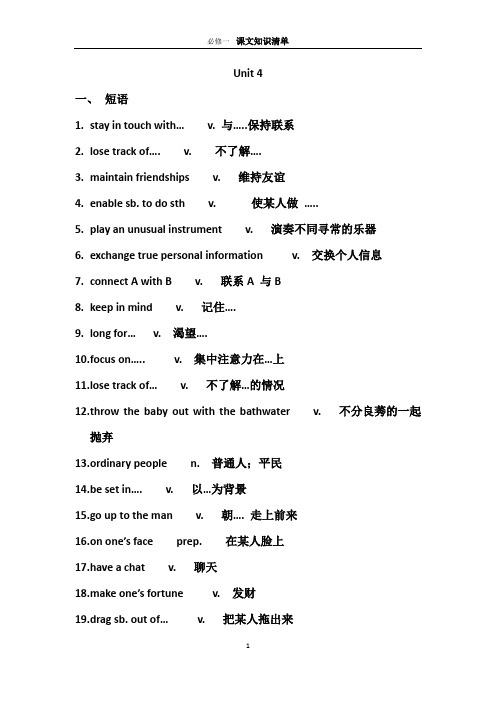
Unit 4一、短语1.stay in touch with…v. 与…..保持联系2.lose track of…. v. 不了解….3.maintain friendships v. 维持友谊4.enable sb. to do sth v. 使某人做…..5.play an unusual instrument v. 演奏不同寻常的乐器6.exchange true personal information v. 交换个人信息7.connect A with B v. 联系A 与B8.keep in mind v. 记住….9.long for…v. 渴望….10.f ocus on….. v. 集中注意力在…上11.l ose track of…v. 不了解…的情况12.t hrow the baby out with the bathwater v. 不分良莠的一起抛弃13.o rdinary people n. 普通人;平民14.b e set in…. v. 以…为背景15.g o up to the man v. 朝…. 走上前来16.o n one’s face prep. 在某人脸上17.h ave a chat v. 聊天18.m ake one’s fortune v. 发财19.d rag sb. out of…v. 把某人拖出来20.h ear from sb. v. 收到某人来信21.h ave sth done v. (1)使…..被别人做(2)主语遭受不幸22.h ave one’s destiny worked out v. 定下某人的命运23.t urn up vi 出现24.g et a plain clothes man to do the job v. 让一个便衣做这个工作25.u nfold the note v. 打开便条26.b e ashamed of…. v. 因..而羞愧27.i n one’s + 几十的复数prep. 某人几十岁时28.二、句型1.mean doing sth v. 意味着做….动名词做主语,谓语用单数。
Unit4知识清单(预习复习知识点详解)-牛津译林版九年级英语上册

9A Unit 4 Growing up 知识清单一、Comic strip and Welcome to the unit.1.grow up 长大Eg: grow up into a beautiful girl 长成一个漂亮的姑娘’s on your mind? 你在想什么?★on one’s mind 挂在心上;惦念【in one’s mind 在某人的脑海里】’s up?= What’s wrong? =What’s the matter? 怎么了?4.That’s all right. / That’s OK./ Never mind . / It doesn’t matter. 没关系,不要紧。
5. build another one for yourself 为你自己再建一个【build sth. for sb.为某人建造某物】6. Don’t wake me up until you finish building it. 【finish doing sth. 做完某事】直到你建完后再叫醒我。
【until引导时间状从,主将从现】7.do a survey on ..... 做一个关于......的调查8.in different times 在不同的时代【time作可数名词:时代;作不可数名词:时间】9.I can read them whenever I want to. 无论何时我想读的时侯就可以读。
Eg: I will help you whenever you are in trouble. 【whenever引导时间状从,主将从现】whenever = no matter when 无论何时whatever = no matter what 无论什么whoever = no matter who 无论是谁10.learn about the world through the Internet通过/凭借因特网了解这个世界11. As soon as you click the mouse, there’s a great deal of information.①a great deal of = much 大量的【只能修饰不可数名词】②as soon as .... 一.....就..... (引导时间状语从句,主将从现)Eg: We will go on working as soon as the rain stops.二、Reading1.While (he was) attending junior high, Spud tried out for the school team.在就读初中时,Spud报名参加校队。
Unit 4 I have a ball 单元知识必备清单
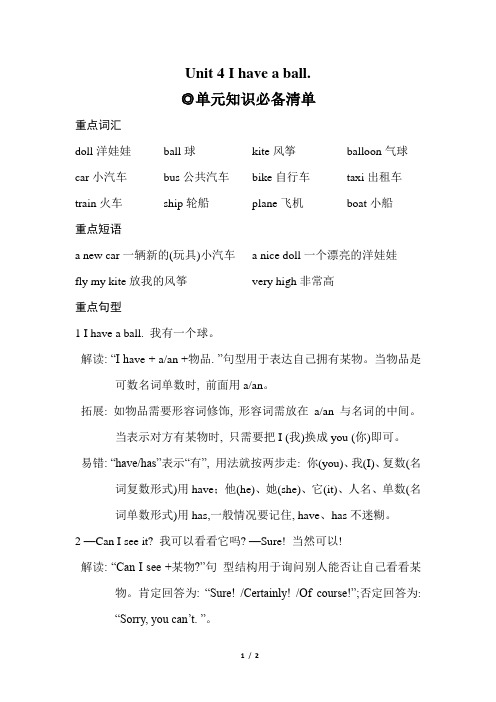
Unit 4 I have a ball.
◎单元知识必备清单
重点词汇
doll洋娃娃ball球kite风筝balloon气球car小汽车bus公共汽车bike自行车taxi出租车train火车ship轮船plane飞机boat小船
重点短语
a new car一辆新的(玩具)小汽车 a nice doll一个漂亮的洋娃娃
fly my kite放我的风筝very high非常高
重点句型
1 I have a ball. 我有一个球。
解读: “I h ave + a/an +物品. ”句型用于表达自己拥有某物。
当物品是可数名词单数时, 前面用a/an。
拓展: 如物品需要形容词修饰, 形容词需放在a/an与名词的中间。
当表示对方有某物时, 只需要把I (我)换成you (你)即可。
易错: “have/has”表示“有”, 用法就按两步走: 你(you)、我(I)、复数(名词复数形式)用have;他(he)、她(she)、它(it)、人名、单数(名
词单数形式)用has,一般情况要记住, have、has不迷糊。
2 —Can I see it? 我可以看看它吗? —Sure! 当然可以!
解读: “Can I see +某物?”句型结构用于询问别人能否让自己看看某物。
肯定回答为: “Sure! /Certainly! /Of course!”;否定回答为:
“Sorry, you can’t. ”。
3 How big!真大啊!
解读: “How +形容词!”是由How引导的感叹句, 常用来表示赞美、惊叹、喜悦等感情。
Unit4(单元知识清单)SectionA(基础知识点语法)九年级英语全一册(人教版)
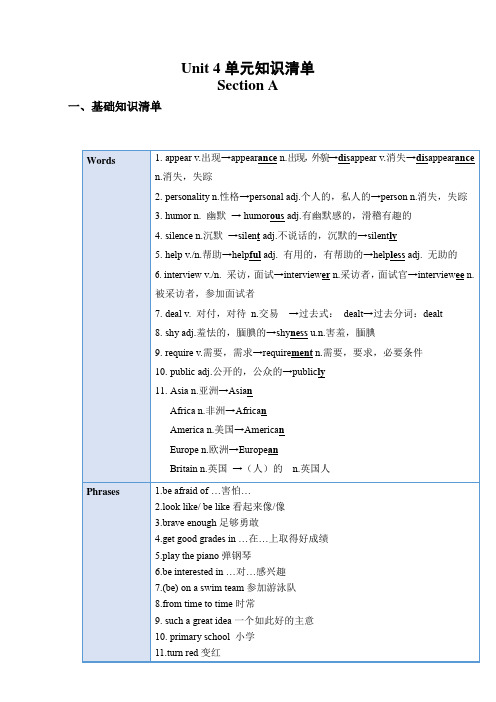
Unit 4单元知识清单Section A一、基础知识清单二、知识点清单1. What's he like now? 他现在什么样子?be like和look likebe like:“像……一样”,常指品德、相貌等相像更侧重人的个性特征。
look like:“看起来像……”,常指外貌上相像。
e.g.What does your sister look like?你姐姐长什么样子?She has long black hair.What's your sister like?你姐姐怎么样?/你姐姐是怎样一个人?She is kind.她很善良。
2. Mario, you used to be short, didn't you?马里奥,你过去很矮,对吗?反义疑问句的特点是“前否后肯”或“前肯后否”,而且后半句在时态、人称、数等方面必须与前半句保持一致。
回答反义疑问句和回答其他一般疑问句的结构一样,如果答语是肯定的,用“Yes +肯定结构”。
如果答语是否定的,用“No +肯定结构”。
回答陈述部分为否定句的反义疑问句时,Yes或是No的汉语意思与它们本身的词义相反。
e.g. They work hard,don't they?他们努力工作,不是吗?Yes, they do.对,他们工作努力。
/No, they don't.不,他们工作不努力They don't work hard, do they? 他们不太努力工作,是吗?Yes, they do. 不,他们工作努力。
/No, they don't. 是的,他们工作不努力3. He used to wear glasses.used to do sth. 过去常常做某事be used to doing sth. 习惯于做某事e.g. Mario used to have short curly hair.They are used to walking to school.This knife is used to cut fruit./ This knife is used for cutting fruit.4. It's been three years since we last saw our primary school classmates.It has been +一段时间+since 从句/过去时间点(since引导的从句用一般过去时,主句用现在完成时)e.g.We have been friends since three years ago.5. She used to be really shy and took up singing ...take up sth/ doing sth 从事、开始培养(兴趣爱好);占据(空间);占用(时间)e.g. Linda took up a new hobby last year.They will take up playing basketball next month.6. She took up singing to deal with her shyness.1.deal with/ do with sth 处理某事而do with与what连用,deal with则与how搭配使用,如:I don't know what to do with the car.He doesn't know how to deal with this matter.2.shy 的比较级shyer, 名词形式shyness7. She dared to sing in front of her class.dare (not) to do sth. (不)敢于做某事dare用作实义动词,此时其后的动词不定式可带to也可不带to,且dare有人称和数以及时态的变化。
UNIT4 单元知识清单-2023-2024学年高中英语人教版(2019)必修第一册

新教材人教版英语必修第一册UNIT 4UNIT 4高频词汇知识点清单UNIT 4 NATURAL DISASTERS目录高频词汇精讲1. flood n. 洪水;大量vi. 淹没;大量涌入vt. 使灌满水;淹没2. ruin n. 废墟;破坏;毁坏vt. 破坏;毁坏;毁灭;使破产3. shelter n. 避难处;居所;庇护vt. 保护;掩蔽vi. 躲避(风雨或危险)4. shock n. 震惊;令人震惊的事;休克vt. 使震惊5. trap vt. (trapped,trapped)使落入险境;使陷入圈套n. 险境;陷阱6. breathe vi. & vt. 呼吸7. effort n. 努力;艰难的尝试;尽力8. suffer vt. 遭受;蒙受vi. (因疾病、痛苦、悲伤等)受苦9. supply n. 供应(量);补给;[pl. ]补给品vt. 供应;供给10. survive vi. 生存;存活vt. 幸存;艰难度过11. calm adj. 镇静的;沉着的vt. 使平静;使镇静12. aid n. 援助;帮助;救援物资vi. & vt. 帮助;援助13. strike v. 侵袭;突击;击打;罢工;使突然想到;划(火柴);敲;鸣;让(某人)觉得n. 罢工;罢课;袭击14. effect n. 影响;结果;效果高频词汇积累结构1. It seems/seemed as if. . . 仿佛/似乎……结构2. was/were doing sth. when. . . 正在做某事,这时……限制性定语从句(1)一、概述二、定语从句的关系代词的用法三、用that不用which的情况四、用which/who不用that的情况五、定语从句中的主谓一致高频词汇精讲1. flood n. 洪水;大量vi. 淹没;大量涌入vt. 使灌满水;淹没情景导学A flood of poems appeared in the Tang Dynasty. 唐朝出现了大量的诗。
Unit4知识清单人教版英语九年级全册
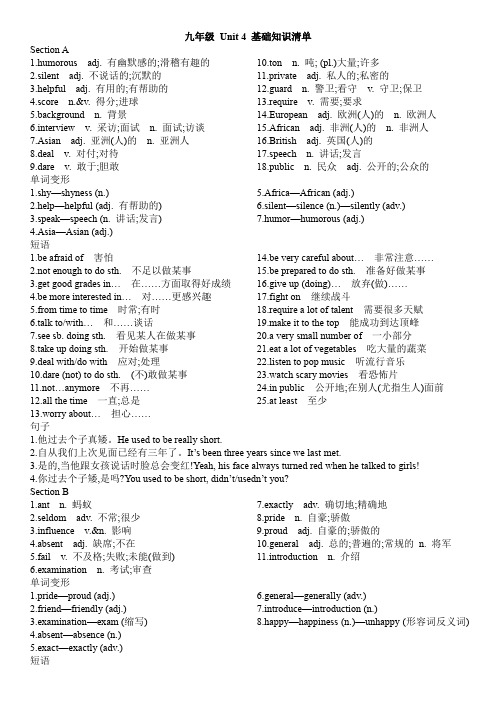
九年级Unit 4 基础知识清单Section A1.humorous adj. 有幽默感的;滑稽有趣的2.silent adj. 不说话的;沉默的3.helpful adj. 有用的;有帮助的4.score n.&v. 得分;进球5.background n. 背景6.interview v. 采访;面试n. 面试;访谈n adj. 亚洲(人)的n. 亚洲人8.deal v. 对付;对待9.dare v. 敢于;胆敢10.ton n. 吨; (pl.)大量;许多11.private adj. 私人的;私密的12.guard n. 警卫;看守v. 守卫;保卫13.require v. 需要;要求14.European adj. 欧洲(人)的n. 欧洲人15.African adj. 非洲(人)的n. 非洲人16.British adj. 英国(人)的17.speech n. 讲话;发言18.public n. 民众adj. 公开的;公众的单词变形1.shy—shyness (n.)2.help—helpful (adj. 有帮助的)3.speak—speech (n. 讲话;发言)—Asian (adj.)5.Africa—African (adj.)6.silent—silence (n.)—silently (adv.)7.humor—humorous (adj.)短语1.be afraid of害怕2.not enough to do sth.不足以做某事3.get good grades in…在……方面取得好成绩4.be more interested in…对……更感兴趣5.from time to time时常;有时6.talk to/with…和……谈话7.see sb. doing sth.看见某人在做某事8.take up doing sth.开始做某事9.deal with/do with应对;处理10.dare (not) to do sth.(不)敢做某事11.not…anymore不再……12.all the time一直;总是13.worry about…担心……14.be very careful about…非常注意……15.be prepared to do sth.准备好做某事16.give up (doing)…放弃(做)……17.fight on继续战斗18.require a lot of talent需要很多天赋19.make it to the top能成功到达顶峰20.a very small number of一小部分21.eat a lot of vegetables吃大量的蔬菜22.listen to pop music听流行音乐23.watch scary movies看恐怖片24.in public公开地;在别人(尤指生人)面前25.at least至少句子1.他过去个子真矮。
Unit4NaturalDisasters(单元知识清单)高一英语(人教版2019)
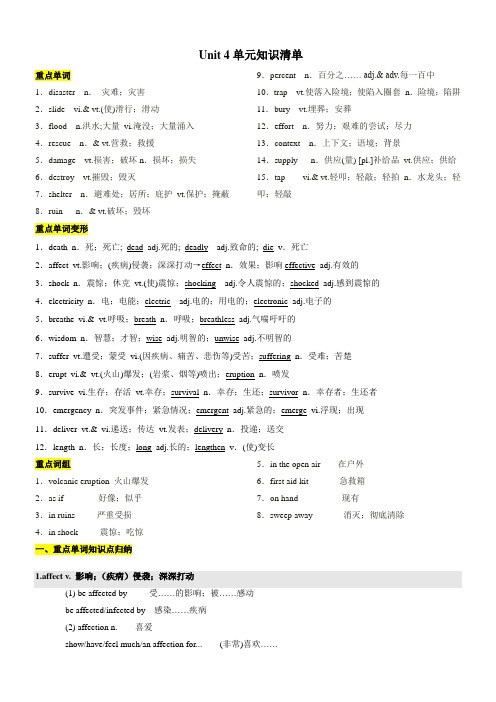
Unit 4单元知识清单重点单词1.disaster n.灾难;灾害2.slide vi.& vt.(使)滑行;滑动3.flood n.洪水;大量vi.淹没;大量涌入4.rescue n.& vt.营救;救援5.damage vt.损害;破坏n.损坏;损失6.destroy vt.摧毁;毁灭7.shelter n.避难处;居所;庇护vt.保护;掩蔽8.ruin n.& vt.破坏;毁坏9.percent n.百分之…… adj.& adv.每一百中10.trap vt.使落入险境;使陷入圈套n.险境;陷阱11.bury vt.埋葬;安葬12.effort n.努力;艰难的尝试;尽力13.context n.上下文;语境;背景14.supply n.供应(量) [pl.]补给品vt.供应;供给15.tap vi.& vt.轻叩;轻敲;轻拍n.水龙头;轻叩;轻敲重点单词变形1.death n.死;死亡; dead adj.死的; deadly adj.致命的; die v.死亡2.affect vt.影响;(疾病)侵袭;深深打动→effect n.效果;影响effective adj.有效的3.shock n.震惊;休克vt.(使)震惊;shocking adj.令人震惊的;shocked adj.感到震惊的4.electricity n.电;电能;electric adj.电的;用电的;electronic adj.电子的5.breathe vi.& vt.呼吸;breath n.呼吸;breathless adj.气喘吁吁的6.wisdom n.智慧;才智;wise adj.明智的;unwise adj.不明智的7.suffer vt.遭受;蒙受vi.(因疾病、痛苦、悲伤等)受苦;suffering n.受难;苦楚8.erupt vi.& vt.(火山)爆发;(岩浆、烟等)喷出;eruption n.喷发9.survive vi.生存;存活vt.幸存;survival n.幸存;生还;survivor n.幸存者;生还者10.emergency n.突发事件;紧急情况;emergent adj.紧急的;emerge vi.浮现;出现11.deliver vt.& vi.递送;传达vt.发表;delivery n.投递;送交12.length n.长;长度;long adj.长的;lengthen v.(使)变长重点词组1.volcanic eruption 火山爆发2.as if 好像;似乎3.in ruins 严重受损4.in shock 震惊;吃惊5.in the open air 在户外6.first aid kit 急救箱7.on hand 现有8.sweep away 消灭;彻底清除一、重点单词知识点归纳1.affect v. 影响;(疾病)侵袭;深深打动(1) be affected by 受……的影响;被……感动be affected/infected by 感染……疾病(2) affection n. 喜爱show/have/feel much/an affection for... (非常)喜欢……2. rescue vi.&vt 营救;n 救援①rescue worker 救援人员②e to one’s rescue 援救某人③rescue. . . from. . . 把……从……解救出来3.ruin vt. 破坏;损害(1) ruin one’s hope/chance/fame/future毁坏某人的希望/机会/名誉/未来(2)in ruins严重受损;破败不堪be/lie in ruins成为废墟;毁灭fall into ruins成为废墟区别:damage:名词和动词都侧重“损”,表示可修复,常和badly, seriously 等副词搭配destroy:侧重“毁”,表示不可修复,不复存在,常和 pletely, entirely 等副词搭配ruin:侧重“毁坏”,使美好的事物失去用途或优良特性,尽管此物仍然存在4.deliver vt.&vi.递送;传达 vt.发表[词块]deliver a speech 作报告deliver a baby 接生delivery n.递送express delivery 快递5. effort n. 努力;艰难的尝试;尽力[词块]with great effort 努力without effort 毫不费力地it takes effort to do sth 做某事需要努力make every effort to do sth 尽全力做某事make an effort/efforts to do sth 努力做某事spare no effort to do sth 不遗余力地做某事6. trap vt.使落入险境;使陷入圈套n.险境;陷阱[词块]be trapped in sth 被困于…….trap sb. into doing sth 诱使某人做某事set a trap 设置陷阱/布下圈套fall into a trap 落入圈套7. bury vt.埋葬;安葬;(1) bury... in...把……埋到……里;使……沉浸于……bury one's face in one's hands双手掩面(2) be buried in... = Bury oneself in (doing.)... 埋头于;专心于;沉浸于8. supply n.供应(量);补给;[pl]补给品 vt.供应;供给water supply 供水be in short supply 供不应求supply and demand 供求关系medical/school/ emergency supplies 医疗/学校/应急用品supply sb/sth with sth=supply sth to sb/sth 给……提供某物表示“为某人提供某物”的短语还有:provide sb. with sth.=provide sth. for sb.offer sb. sth.=offer sth. to sb.9. survive vi.生存;存活vt.幸存;艰难度过survival n. 存活,幸存adj.幸存的,救生用的survivor n. 幸存者survive on 依靠…生存survive from 流传下来10. shelter n.避难所,居所,庇护vi.躲避under the shelter of 在……庇护下shelter sb/sth from 保护某人/某物免受Find/take shelter from 躲避11. strike vi侵袭;突击;击打n.罢工;罢课;袭击be struck by 被…打动It strikes sb that … 某人突然想到……go on strike 罢工stricken 受灾的;患病的;受苦的striker 罢工者;(足球的)前锋;(棒球的)击球手二、重点词组和句型1. . on hand 现有(尤指帮助)【词块积累】in hand 在手头;在进行中;在控制中hand in 交上;提交;呈送hand in hand 手拉手hand over 交出;移交On one hand…, on the other hand…一方面,另一方面2. e to an end 结束;终结【词块积累】at the end of在……尽头;在……末端by the end of 到……结束时;到……时候为止(常与完成时态连用)in the end 最后;终于e to an end 完成;结束make (both) ends meet 使收支相抵;量入为出end up with 以……结束end up doing 最终在做某事3.as if 虚拟语气用法总结6.sb. was/were doing….when… 某人正在做……这时……sb. was/were about to do… when… 某人将要做……这时……sb had just done sth. ..when… 某人刚刚做完……这时……sb was/were on the point of doing(be doing)sth. ..when… 某人正要做完……这时……三、重点语法定语从句一、定语从句的定义:修饰名词或代词的句子叫定语从句。
Unit4Ihaveapenpal(知识清单)人教PEP版英语六年级上册
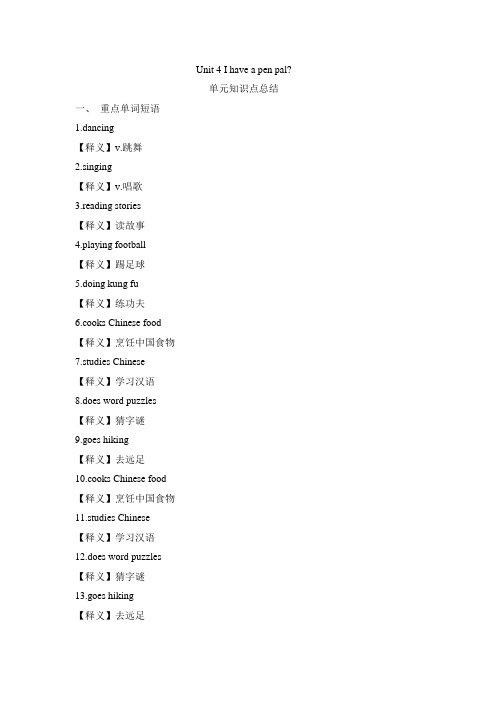
Unit 4 I have a pen pal?单元知识点总结一、重点单词短语1.dancing【释义】v.跳舞2.singing【释义】v.唱歌3.reading stories【释义】读故事4.playing football【释义】踢足球5.doing kung fu【释义】练功夫6.cooks Chinese food【释义】烹饪中国食物7.studies Chinese【释义】学习汉语8.does word puzzles【释义】猜字谜9.goes hiking【释义】去远足10.cooks Chinese food【释义】烹饪中国食物11.studies Chinese【释义】学习汉语12.does word puzzles【释义】猜字谜13.goes hiking【释义】去远足二.重点句式1.【课文应用】He likes reading stories.他喜欢读故事。
当我们想要表达自己的喜好时,经常会用到like这个词。
例如:I like sports.我喜欢体育运动。
如果要表达“喜欢做某事”,like后面要接动词ing形式或动词不定式。
例如:I like playing football./I like to play football.我喜欢踢足球。
2.【课文应用】What are Peter's hobbies?彼得的爱好是什么?He likes reading stories.他喜欢读故事。
【句型结构】问句:What are+his/her/名词所有格+hobbies?答语:He/She likes+动词ing形式(+其他).【重点解析】问句是由what开头的特殊疑问句,what意为“什么”。
答语中的主语为第三人称单数,谓语动词要用like的第三人称单数形式likes。
【生活实例】兴趣小组报名开始了,Miss Li询问Bob的爸爸Bob的爱好是什么。
让我们来看一看他们的对话:Miss Li:What are Bob's hobbies?鲍勃的爱好是什么?Bob's dad:He likes swimming and dancing.他喜欢游泳和跳舞。
高中英语 人教必修第一册 Unit4 Natural Disaster 知识清单

Unit 4 Natural Disasters1. rescue. n/vt营救;救援《1》把某人从、、、营救出来: rescue sb from《2》进行营救: attempt a rescue《3》设法(实行)营救: make/perform a rescue《4》他答应在我有危险的时候会来救我。
He promised to come to my rescue if I was in danger.2. damage vt.损坏、迫害。
n损失;损害《1》弥补损失: recover a damage《2》赔偿损失: pay for damage《3》遭受损失、蒙受损害: suffer damage《4》洪水对庄稼造成重大的损毁。
The flood did/caused great damage to the crop.3.survive. vi生存;存活vt幸存、艰难度过survivor幸存者;生还者《1》靠、、、活下来;靠、、、生存: survive on《2》比某人多活、、、survive sb by《3》在这次空难中没有人幸免于难。
Nobody survived the disaster.4. destroy vt.摧毁;毁灭destruction n破坏;毁灭《1》你的话会破坏孩子的自信心。
Your words will destroy your child’s confidence.《2》我们不能再继续破坏环境了。
We can’t continue to destroy the environment.5.affect vt影响;(疾病)侵袭;深深打动;使感染(疾病)effect n 影响;效果;结果《1》我们被他的真诚深深打动。
We were affected by his sincerity.《2》如今科技极大地影响了我们的生活。
Nowadays technology has greatly affected our life.6.shelter n避难所;居所;庇护vt 保护掩蔽躲避《1》那棵大树使我们免受大雨的侵袭.The big tree sheltered us from the heavy rain.《2》这个计划是为无家可归的人提供住所。
Unit 4 What can you do (知识清单)人教PEP版英语五年级上册
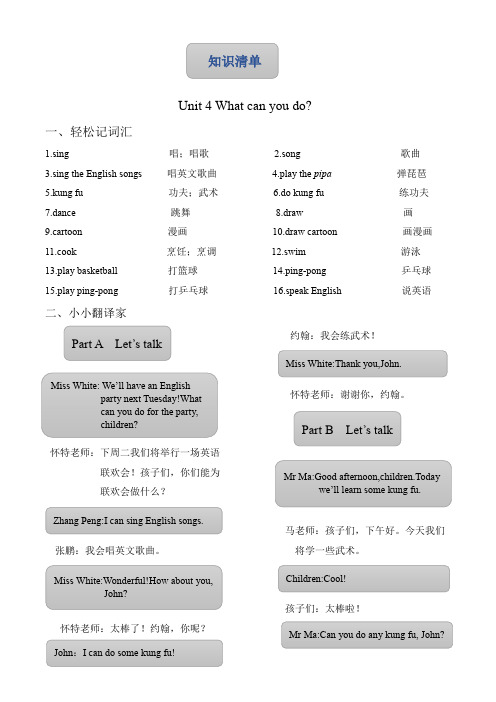
Unit 4 What can you do?一、轻松记词汇1.sing 唱;唱歌2.song 歌曲3.sing the English songs 唱英文歌曲4.play the pipa 弹琵琶5.kung fu 功夫;武术6.do kung fu 练功夫7.dance 跳舞8.draw 画9.cartoon 漫画 10.draw cartoon 画漫画 11.cook 烹饪;烹调 12.swim 游泳 13.play basketball 打篮球 14.ping -pong 乒乓球 15.play ping -pong 打乒乓球 16.speak English 说英语二、小小翻译家约翰:我会练武术!怀特老师:谢谢你,约翰。
怀特老师:下周二我们将举行一场英语 联欢会!孩子们,你们能为 联欢会做什么?马老师:孩子们,下午好。
今天我们 张鹏:我会唱英文歌曲。
将学一些武术。
孩子们:太棒啦!怀特老师:太棒了!约翰,你呢?马老师:约翰,你会武术吗? 你想要一个新朋友吗?考虑一下我吧我是机器人罗宾!我既友好又有趣。
我 约翰:是的,我会武术。
会说英语和汉语。
我会练一些武术。
我会打乒乓球,但我不会游泳。
你会做什么?请给我发一封电子 马老师:太棒啦!邮件,地址是:*****************. 罗宾 三、句型分析 马老师:奥利弗,你会武术吗? 奥利弗:不,我不会武术。
此句是由what 引导的特殊疑问句,用 来询问某人能/会做什么,其基本句型是: What+can+主语+do ?do 在此不是助 马老师:没问题。
我可以帮助你。
动词,而是实义动词,意为“做”,答语 是:主语+can+动词原形+其他.例如:--What can you do?你会做什么? --I can clean my room.我会打扫我的 房间。
--What can Mike do?-- He can play football.他会踢足球。
Unit 4 知识清单

Unit 4Where do you work?一、核心词汇grandfather(grandpa)(外)祖父grandmother(grandma) (外)祖母driver司机cinema 电影院shop 商店CCTV 中国中央电视台hospital 医院work 工作study 学习in 在……里面on 在……上面at在二、拓展词汇bank 银行hotel 宾馆shopping mall 购物中心restaurant 饭馆company 公司library 图书馆三、核心句型1. — Where do you work? 你在哪里工作?— I work in a cinema. 我在一家电影院工作。
— Where do you study? 你在哪里学习?— I study at Sunny School. 我在阳光学校学习。
解读:这是询问对方在哪里工作或学习的句子。
举一反三: — Where do you work, Jim? 你在哪里工作,吉姆?— I work in a library. 我在图书馆工作。
— Where do you study, Anna? 你在哪里学习,安娜?— I study at a primary school. 我在一所小学学习。
2.— Where does your father work? 你的爸爸在哪里工作?— He works in Beijing Hospital. 他在北京医院工作。
— Where does your mother work? 你的妈妈在哪里工作?— She works at CCTV. 她在中国中央电视台工作。
解读:这是询问他人工作地点的句子。
举一反三: — Where does your grandfather work? 你的爷爷在哪里工作?— He works on a farm. 他在一个农场工作。
— Where does your uncle work? 你的叔叔在哪里工作?— He works in a restaurant. 他在一家饭馆工作。
Unit 4 The Internet Connects Us知识清单
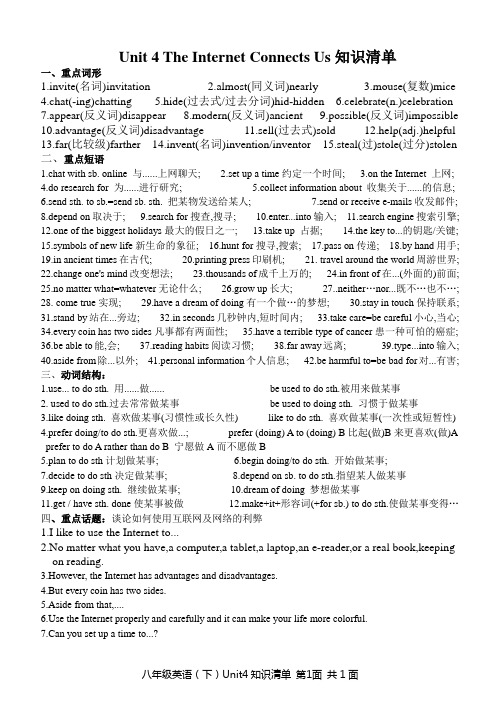
Unit 4 The Internet Connects Us知识清单一、重点词形1.invite(名词)invitation2.almost(同义词)nearly3.mouse(复数)mice4.chat(-ing)chatting5.hide(过去式/过去分词)hid-hidden6.celebrate(n.)celebration7.appear(反义词)disappear8.modern(反义词)ancient9.possible(反义词)impossible 10.advantage(反义词)disadvantage 11.sell(过去式)sold 12.help(adj.)helpful13.far(比较级)farther 14.invent(名词)invention/inventor 15.steal(过)stole(过分)stolen二、重点短语1.chat with sb. online 与......上网聊天;2.set up a time约定一个时间;3.on the Internet 上网;4.do research for 为......进行研究;5.collect information about 收集关于......的信息;6.send sth. to sb.=send sb. sth. 把某物发送给某人;7.send or receive e-mails收发邮件;8.depend on取决于; 9.search for搜查,搜寻; 10.enter...into输入; 11.search engine搜索引擎;12.one of the biggest holidays最大的假日之一; 13.take up 占据; 14.the key to...的钥匙/关键;15.symbols of new life新生命的象征; 16.hunt for搜寻,搜索; 17.pass on传递; 18.by hand用手;19.in ancient times在古代; 20.printing press印刷机; 21. travel around the world周游世界;22.change one's mind改变想法; 23.thousands of成千上万的; 24.in front of在...(外面的)前面;25.no matter what=whatever无论什么; 26.grow up长大; 27..neither…nor...既不…也不…;28. come true实现; 29.have a dream of doing有一个做…的梦想; 30.stay in touch保持联系;31.stand by站在...旁边; 32.in seconds几秒钟内,短时间内; 33.take care=be careful小心,当心;34.every coin has two sides凡事都有两面性; 35.have a terrible type of cancer患一种可怕的癌症;36.be able to能,会; 37.reading habits阅读习惯; 38.far away远离; 39.type...into输入;40.aside from除...以外; 41.personal information个人信息; 42.be harmful to=be bad for对...有害;三、动词结构:e... to do sth. 用......做...... be used to do sth.被用来做某事2. used to do sth.过去常常做某事be used to doing sth. 习惯于做某事3.like doing sth. 喜欢做某事(习惯性或长久性) like to do sth. 喜欢做某事(一次性或短暂性)4.prefer doing/to do sth.更喜欢做...; prefer (doing) A to (doing) B比起(做)B来更喜欢(做)A prefer to do A rather than do B 宁愿做A而不愿做B5.plan to do sth计划做某事;6.begin doing/to do sth. 开始做某事;7.decide to do sth决定做某事; 8.depend on sb. to do sth.指望某人做某事9.keep on doing sth. 继续做某事; 10.dream of doing 梦想做某事11.get / have sth. done使某事被做12.make+it+形容词(+for sb.) to do sth.使做某事变得…四、重点话题:谈论如何使用互联网及网络的利弊1.I like to use the Internet to...2.No matter what you have,a computer,a tablet,a laptop,an e-reader,or a real book,keeping on reading.3.However, the Internet has advantages and disadvantages.4.But every coin has two sides.5.Aside from that,....e the Internet properly and carefully and it can make your life more colorful.7.Can you set up a time to...?五、重点语法:if 引导的条件状语从句(见课本152面)( )1.I’ll give the book to him if he _____ here next Sunday.A. will comeB. comesC. is comingD. came( )2.If you _____ to the party, you’ll have a great time. A. will go B. went C. go D. going ( )3.--What are you going to do tomorrow? --We’ll go to the library tomorrow if it _____.A. isn’t rainB. rainC. won’t rainD. doesn’t rain( )4.I ______ her the answer if she ______ me.A. can tell, will askB. will tell, will askC. would tell, askD. will tell, asks( )5.I don't know if he ______.If he _______,I will tell you.es , comesB.will come , will comees , will comeD.will come , comes6. If I ________(feel) tired, I _______________ (have) to have a rest.7.There _______________( be) more pollution if there __________(be) fewer trees.8. If Marcia _____________(live) alone, she ___________________( keep) a pet parrot.na ________________( buy) a new dress if the old one ____________(be) out of style.10.I ____________(go) to the beach if it________________ ( not rain) this week.11.If she ____________(get) up late, she ________________ ( not catch) the early bus.12. If you_______ ______, you ______ _______ good marks.如果努力学习,你就会取得好成绩。
- 1、下载文档前请自行甄别文档内容的完整性,平台不提供额外的编辑、内容补充、找答案等附加服务。
- 2、"仅部分预览"的文档,不可在线预览部分如存在完整性等问题,可反馈申请退款(可完整预览的文档不适用该条件!)。
- 3、如文档侵犯您的权益,请联系客服反馈,我们会尽快为您处理(人工客服工作时间:9:00-18:30)。
Unit 4 知识清单:
一、词组:
1. 举办一个令人惊喜的晚会have a surprise party
2.不再not…anymore=no more 3讲三种语言speak three languages 4. 生某人的气be mad at sb=be angry with sb 5.传递信息pass on the message 6.给某人传口信pass the message to sb 7. 首先first of all = at first 8. 患了感冒have a cold
9. 从事;进行work on 10. 应该做某事be supposed to do sth=should do sth 11. 擅长be good at 12. 在……方面做得好do well in 13. 感到紧张get nervous 14.身体健康be in good health 15.打开open up 16. 发现自然科学确实难find science really difficult 17.抄别人的作业copy other’s homework 18. 保护,照料care for 19. 克服get over 20.养成一个坏习惯start a bad habit 21.得到成绩单get the report card 22. 忘记做某事forget to do sth
二、知识点:
1. ever “曾经,从来”,常用于否定句和疑问句中。
反义词never 意为“未曾;从不”。
2. hard-working 工作努力的;勤勉的(形容词)work hard 努力工作(动词词组)
3. message 可数名词,“消息,信息,口信”表示别人(尤其在接电话时)愿意传话。
news 不可数名词“新闻,消息”information 不可数名词“信息”4. hope的用法1)hope to do sth 2)hope+ that 从句
wish的用法1)wish to do sth 希望做某事2)wish sb to do sth 希望某人做某事3)wish sb. sth. eg: wish you a good trip 祝你旅途愉快
4)wish + that 从句(多用于虚拟语气)
5. be in good health 身体健康= be healthy
keep in good health = keep healthy= stay healthy. = keep fit 保持健康
6. disappointing (事物)令人失望、扫兴的(同surprising)
disappointed (人)感到失望的,失意的(同surprised)
7. have a hard (difficult) time with sth. 做某事很困难,很艰辛
= have a hard(difficult) time (in) doing sth.
=have trouble (difficulty/problems) with sth
=have trouble (difficulty/problems) (in) doing sth
8. be sure to do 一定能做某事be sure + that 从句
9. forget to do sth 忘记做某事forget doing sth 忘记已做过某事
remember to do sth. 记得去做某事remember doing sth. 记得做了某事
10.both …and …(两者)都,(做主语时后的谓语动词要用复数形式)
否定形式:neither … nor …两者都不,(谓语动词就近原则)
11.make sb do sth 使某人做某事make sb/sth + 形容词使某人怎么样
12. experience (n) 经历(可数);经验(不可数)
(v) 经历
三、句子:
1. 她说她将在周五晚上为Lana 举办一个令人惊喜的聚会。
She said she was having a surprise party for Lana on Friday night.
2. Lana说她不再生Marcia的气了。
Lana said she wasn’t mad at_ Marcia anymore.
3. Lana 说她将带一些饮料和小吃到你家里。
Lana said she would bring some drinks and snacks to your house.
4. 对于肥皂剧“年轻岁月”里的人来说,这是个激动人心的一周。
It was an exciting week for the people on the soap opera“Young Lives”.
5. 今天早晨你应该在车站见到Amy 并把它还给Amy,但是Amy 没有到车站来。
You were supposed to meet at the bus stop this morning to return it, but Amy didn’t come to the stop.
6. 一切都好吗?How is it going?
7. 听说他上周感冒了我很难过。
I was sorry to hear_ that he had a cold last week.
8. 上周我结束了年终考试而且今天得到了成绩报告单。
I finished my end-of –year exams last week and got my report card today.
9. 这个学期我的科学课学得挺困难。
I had a really _ hard time with science this semester.
10. 我发现我最差的评价来自我的自然老师,我并不感到吃惊。
I wasn’t surprised to find that my worst report was from my science teacher.
11. 上个周,我们在学校大吵了一场, 而且她不跟我说话。
Last week in school, we had a big fight,and she didn’t talk to me.
12. 我问她为什么想那么做?I asked her why she wanted to do that.
13. 我说我认为抄袭我的家庭作业对她来说并不是个好主意。
I said I didn’t think it was a good idea for her to copy my homework.
14. 她说如果她做自己的工作那将好得多。
She said it was much better if she did her own work.
15. 她问我是否可以抄我的作业。
She asked me if she could copy my homework.
16 幸运的是,杨蕾的父母同意了他女儿的决定。
Fortunately , Yang Lei’s parents agreed with her daughter’s decision .
18. 年轻人需要经历不同的事情。
Young people need to experience different things.
1。
